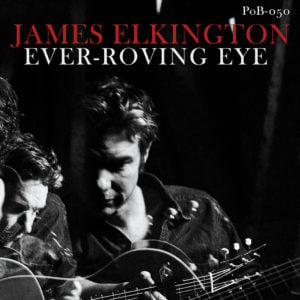 James Elkington – Ever-Roving Eye
James Elkington – Ever-Roving Eye
Paradise of Bachelors – Out Now
How on earth I missed out on James Elkington, whose debut CD Wintres Woma appeared back in 2017, I just can’t fathom. But if it was anything like as compelling and characterful as his second album, Ever-Roving Eye, then I’m a-looking to catch up pretty damn quick.
James is British but has been based in Chicago for a couple of decades now, making a name for himself on the city’s improv music circuit as well as a go-to sideman, working in that latter capacity for the likes of Wilco frontman Jeff Tweedy, Richard Thompson, Tortoise and Mount Shasta as well as helping out on the production side for others including Steve Gunn (The Unseen In Between), Michael Chapman (50), Itasca (Spring) and Joan Shelley (Like the River Loves the Sea) who he was due to tour with this month, but that’s all been postponed due to the Covid crisis. But even so, it’s surprising that it should’ve taken so long for him to get around to making a solo record.
Work on Ever-Roving Eye was begun barely a year or so after Wintres Woma came out. Still, its title turned out to be prophetic, not least in the sense that James’s desire to be completely satisfied with the final product became something of an obsession. And listening to its intricate layerings and meticulous, deliquescent fingerpicking, one can well understand the desire for perfection. For this is music that cannot, and should not, be undersold or compromised by any hint of dropped timing or misjudgement in coordination or mood. There’s often a strong rhythmic impetus, sure, but achieving this is never at the expense of atmosphere or imagery.
The closest comparison I can make – and neither party should suffer in the slightest by the comparison – is with Bert Jansch. The insistently tumbling rhythms of album opener Nowhere Time (a double-edged title if ever there was one, bearing in mind the track’s metre) certainly call to mind vintage Pentangle, with scattergun tossed restless wordscape and allusive meanings flitting by with the shifting time-signature. Carousel is built around an even more tumblesome guitar part, a whirling merry-go-round of cascading notes. The catchy but ominously drumbeat-driven tattoo of the insomnia-fuelled Sleeping Me Awake feels closer to the troubadour folk of Jackson C. Frank, but its backing is weirder with its subliminal half-dreamed vocal effects. Leopards Lay Down then slows the tempo with jazzy double bass and brushed drums slinking in tandem with James’s admonition to “be watchful of hyenas”; flute and vibes join the party before the chorus mantra returns, and soft vocal chanting brings the song to a close. The triple-time minor-key mystery of Moon Tempering recalls Nick Drake with its shifting and wearily restless chamber-folk enhancements. Back to the headlong tumbling for the instrumental Rendlesham Way, a “light-flight” that takes in Davy Graham-style folk-baroque and Michael Chapman-esque gestures before taking a break midway in an expansive little interlude.
Late Jim’s Lament stumbles at quite a lick along twilight Soho alleys avoiding the glare of the street lights to find a short-cut (worried about being “late” in both senses of the word). On the darkly melancholic Go Easy On October James engages a Lou Reed-like depth on his resonant baritone, with rippling guitar textures in counterpoint and a mournful violin vying for attention further back in the mix. The album’s mystical-sounding title track is a 3/2 meditation with eastern modal overtones in the droning vocal parts before acceding to a generously multitracked, building electric guitar solo. Finally, the melodic contours of enigmatic closing song Much Master recall Steve Ashley, while James’ vocal delivery takes on something of a Lou Reed tone, ushering in the contrasting mournful timbres of pedal steel and bass clarinet – imagine a dark but very satisfying mug of cocoa on which to retire to bed.
The overall sound of the album is of course largely down to the personality of James himself, his impeccable, crisp guitar picking and often intensely characterful voice. Still, much additional credit should be laid at the door of his collaborators. These comprise Nick Macri on bass and Macie Stewart on violin (both of whom had worked with James on Wintres Woma), augmented by Lia Kohl on cello, Paul Von Mertens on woodwinds, and The Weather Station’s Tamara Lindeman on backing vocals.
But, taking everything into account, the ultimate impression left by this mesmerising album is that of an uneasy, perplexed guy whose cynical despair is expressed in the memorable line from Nowhere Time “There’s a master plan somebody understands, And I wish that one was me”. However thoughtfully you might think James has put his music together. Such cryptic genius has a habit of being similarly inscrutable.
Photo Credit: Timothy Musho

